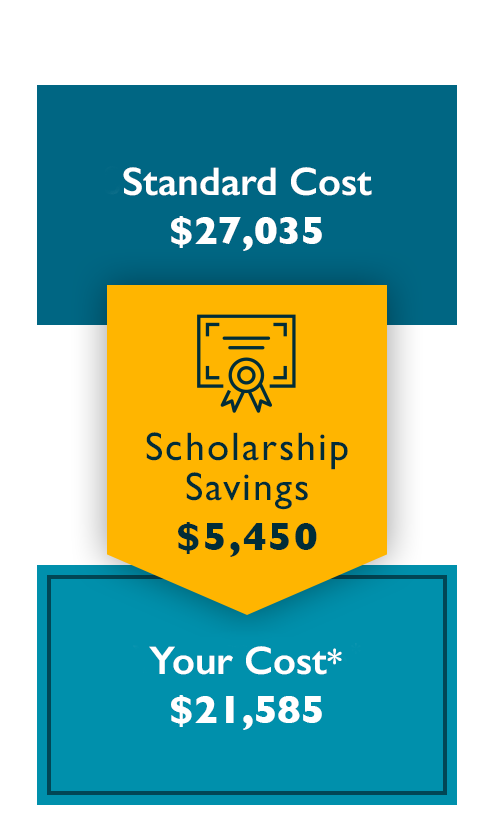Why Choose Walden?
Program Details
Curriculum – General Program Specialization
- 48 quarter credits
- Foundation course (3 cr.)
- Core courses (30 cr.)
- Elective courses (10 cr.)
- Capstone (5 cr.)
View the COMPLETE CURRICULUM PLAN.
Time to completion will vary by student, depending on individual progress and credits transferred, if applicable. For a personalized estimate of the number of your transfer credits that Walden would accept, call an enrollment adviser at 855-646-5286.
Admission Requirements
Program Admission Considerations: A bachelor's degree or higher.
General Admission Requirements: Completed online application and transcripts. Please note that the materials you are required to submit may vary depending on the academic program to which you apply. More information for international applicants.
| Curriculum Component | Requirements | Cost | AMOUNT |
|---|---|---|---|
| Tuition | 48 quarter credit hours | $545 per quarter hour | $26,160 |
| Program Fee | Per quarter | $175 | $875 |
| $27,035** | |||
| BELIEVE & ACHIEVE SCHOLARSHIP YOUR TUITION | -$5,450 $21,585* | ||
*Represents minimum time to completion and Believe & Achieve Scholarship. Your actual total program time and costs may vary. Believe & Achieve Scholarship savings based on current tuition. See Scholarship Details for more information.
**Note: Time to completion and cost are not estimates of individual experience and will vary based on individual factors applicable to the student. Factors may be programmatic or academic, such as tuition and fee increases; transfer credits accepted by Walden; program or specialization changes; unsuccessful course completion; credit load per term; part-time vs. full-time enrollment; writing, research, and editing skills; use of external data for the doctoral study/dissertation; and individual progress in the program. Other factors may include personal issues such as the student’s employment obligations, caregiving responsibilities, or health issues; leaves of absence; or other personal circumstances. For a personalized estimate of the number of your transfer credits that Walden would accept, call an Enrollment Specialist at 844-856-4658.
Tuition and fees are subject to change. Books and materials are not included and may cost between $1,000 and $1,400.
Program Outcomes
An MPA Degree Centered on Practical Skills
In our MPA degree online program, you’ll learn how to deliver effective public services through policy analysis, program evaluation, and strategic planning. Explore how to balance budgets, write and negotiate contracts, manage conflict, and cultivate partnerships. Build the organizational capabilities you need to effectively administer and oversee diverse and complex agencies. You’ll also have the chance to create your own professional portfolio to share with potential employers.
Be Immersed in Experiential Learning
Walden’s MPA degree online program blends a practical curriculum with engaging classroom experiences such as case studies, TED Talks, and decision trees. Develop valuable skills and instincts in safe—yet highly authentic—scenarios. Build confidence as a public administration leader while learning how to apply your new knowledge and competencies to your current and future roles.
You’ll also use innovative tools such as Walden Heights, a virtual city that allows you to visit different locations (e.g., City Hall) to find resources and complete assignments. In addition, virtual simulations allow you to gain hands-on practice in a low-stakes environment (e.g., presenting to a city council).
Career Outlook
Whether at the local, state, or federal level, providing effective public service increasingly relies on collaboration with multiple government agencies and private and nonprofit organizations. With an online master’s degree in public administration, you’ll be academically prepared to lead and manage public programs while fostering cross-sectoral partnerships. This highly versatile degree can help pave the way to opportunities in the government, education, legal, and nonprofit sectors.
An online Master of Public Administration degree can academically prepare you to work in settings such as:
- Government agencies
- Nonprofit organizations
- Education organizations
- Healthcare organizations
- Law enforcement and the military
Career options may require additional experience, training, or other factors beyond the successful completion of this degree program.
Learning Outcomes
Graduates of our online Master of Public Administration (MPA) degree program will be prepared to:
- Explain the processes of public policy development, implementation, and evaluation to meet the goals and needs of diverse stakeholders.
- Critically assess major theories and concepts associated with the development of public policy and public administration.
- Assess major theories and concepts of public policy and public administration.
- Apply methods of scholarly research and data analysis to study public policy issues.
- Assess ethical strategies for implementing organizational change and development.
- Design strategies for diverse and inclusive collaboration across the research, policy, and practice sectors to address complex social problems.
- Evaluate best practices of inclusive public policy and administration that promote diverse perspectives in local, state, national, and international agencies.
Testimonials
Having completed my master’s and doctoral degrees with Walden University, I have a scholarly foundation on which to build.
I wanted to enhance my education, and Walden was my key.
My passion for public service initially motivated me to enroll at Walden.
Related Articles
You May Also Be Interested In
FAQ About Walden’s Online Master of Public Administration (MPA)
An online master’s in public administration program is a great choice for working professionals who want to develop the advanced competencies required for a range of career options, including those at federal, state, and local agencies as well as in the private and nonprofit sectors. When you enroll in an online master’s program, you can study from home using a flexible learning platform that allows you to continue working full time as you earn your degree. Online degree programs, like the ones at Walden University, offer a schedule that combines the structure of weekly assignments and due dates with the flexibility of choosing times to participate that are most convenient for you. Online degree programs also attract a diverse student body, allowing you to gain different perspectives and collaborate with classmates who offer insights into other business cultures and problem-solving techniques that can inform your own approaches to problems and opportunities. If you have good time management skills and would like to better balance work and family with the demands of going back to school, consider the many benefits of Walden’s online Master of Public Administration program.
Today’s urban communities face a plethora of increasingly complex challenges, including crime and public safety, poverty, homelessness, pollution, and healthcare access. If you plan to pursue a leadership job in public administration, you’ll need to gain the skills and knowledge required to tackle tough problems surrounding these pressing issues. To help aspiring public administration leaders develop good problem-solving skills, many colleges and universities have integrated hands-on learning experiences into their public administration degree programs.
The virtual city used as an interactive teaching tool in the Master of Public Administration (MPA) online degree program at Walden University is a great example of how public administration students learn to solve problems through practice. The fictional city offers scenarios of real-life challenges in public administration faced by local leaders. Community issues involving a high school, businesses, city hall, and a hospital are explored throughout the MPA degree program.
Those with a Master of Public Administration (MPA) degree earn an average of $68,408 a year, though there are ranges depending on the position.1 For example, the average annual salary for a government program manager is $90,985, though it ranges from $51,000 to $145,000 and, depending on the company, may or may not include bonuses and profit sharing.2
1Source: www.payscale.com/research/US/Degree=Master_of_Public_Administration_(MPA)/Salary?signedUp (viewed March 3, 2021). National long-term projections may not reflect local and/or short-term economic or job conditions, do not guarantee actual job growth, and are subject to change.
2 Source: www.payscale.com/research/US/Job=Government_Program_Manager/Salary (viewed March 3, 2021). National long-term projections may not reflect local and/or short-term economic or job conditions, do not guarantee actual job growth, and are subject to change.
Earning a Master of Public Administration (MPA) can prepare you with the critical problem-solving skills needed for leadership positions such as:
- Deputy city manager
- U.S. Foreign Service officer
- Policy researcher
- Senior strategic policy advisor
- Emergency management director
- Budget analyst
- Human resources director
- Public health administrator
- Economic development planner
Should you continue your education and earn a PhD in Public Policy and Administration, you can gain the knowledge and skills to prepare you to pursue a wide spectrum of leadership positions such as:
- Legislative aide
- Policy analyst
- Research director
- Senior-level public executive
- Government affairs officer
- Private consultant
- Senior-level nonprofit manager
Career options may require additional experience, training, or other factors beyond the successful completion of this degree program.
Earning a Master of Public Administration (MPA) can prepare you with the critical problem-solving skills needed for leadership positions such as:
- Deputy city manager
- U.S. Foreign Service officer
- Policy researcher
- Senior strategic policy advisor
- Emergency management director
- Budget analyst
- Human resources director
- Public health administrator
- Economic development planner
Should you continue your education and earn a PhD in Public Policy and Administration, you can gain the knowledge and skills to prepare you to pursue a wide spectrum of leadership positions such as:
- Legislative aide
- Policy analyst
- Research director
- Senior-level public executive
- Government affairs officer
- Private consultant
- Senior-level nonprofit manager
Career options may require additional experience, training, or other factors beyond the successful completion of this degree program.
1Source: Bureau of Labor Statistics, Occupational Outlook Handbook, Administrative Services and Facilities Managers, Job Outlook. Retrieved September 2021 using SOC code 11-3012. National long-term projections may not reflect local and/or short-term economic or job conditions and do not guarantee actual job growth.
2Source: Bureau of Labor Statistics, Occupational Outlook Handbook, Social and Community Service Managers, SOC code 11-9151. Retrieved September 2021. National long-term projections may not reflect local and/or short-term economic or job conditions and do not guarantee actual job growth.














